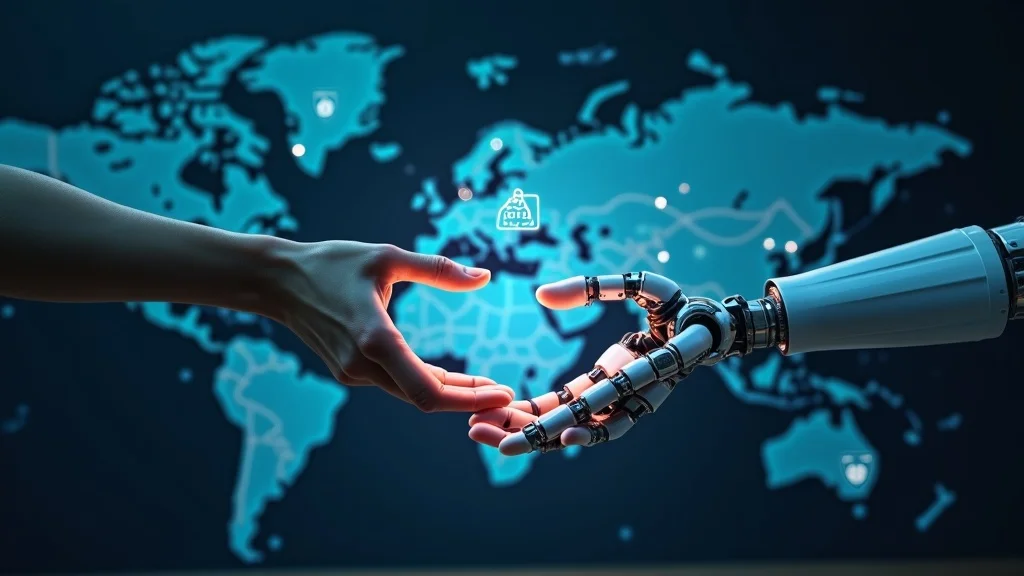Did you know? There is currently no universal agreement on what ethical AI truly means. This surprising uncertainty is more than a challenge—it is a powerful opportunity to shape the future of artificial intelligence globally. In this rapidly evolving landscape, the very meaning of ethics in AI is still being negotiated by voices from diverse cultures, regions, and communities, each bringing their distinct values and concerns to the table.
In this article, we dive deep into the global ethical AI debate, investigating how various actors are defining responsible AI, the gaps between principles and practices, and the vital role regions like Africa play in creating inclusive AI ethics that respect local realities. As Editorial Team AI Africa News from AI NEXUS AFRICA NEWS explains, the stakes are high: "Who controls the meaning of ethics?" shapes how AI will impact societies for decades to come.

Opening the Global Ethical AI Debate: A Startling Reality
The conversation on ethical AI is currently a global patchwork without a single, universally accepted definition. Countries and cultures are still trying to articulate what "responsible AI" should look like according to their values, social contexts, and governance priorities. This fragmentation highlights the complexity of governing AI technology that is inherently global yet deeply local in impact.
The divide between high-level ethical principles and real-world AI application remains stark. While international frameworks outline ideals of fairness, transparency, and accountability, actual AI development often overlooks the diverse conditions of rural areas, multilingual societies, and climate-vulnerable regions. The practical consequences of AI can thus disproportionately affect communities historically excluded from the technology design and policymaking processes.
As Editorial Team AI Africa News notes, "AI governance is being built in real time. The real power lies in defining what ethical AI means—because whoever shapes this narrative, shapes the future." This evolving dialogue is an opportunity not only to critique but to co-create an AI ethics model that is grounded in context, community, and care.
What You'll Learn: Key Insights into the Global Ethical AI Debate
The evolving definitions and interpretations of ethical AI across regions
The gap between AI ethics principles and real-world AI development
The role of diverse cultures and communities in shaping responsible AI
Expert perspectives on the future of AI ethics and governance
Common ethical concerns and challenges in artificial intelligence
Defining Ethical AI in the Context of the Global Ethical AI Debate
"Ethical AI is not a fixed destination. It is a conversation, a negotiation, a narrative we are still writing," explains the expert, emphasizing the fluid nature of AI ethics.
At its core, ethical AI involves principles and practices designed to ensure AI technologies promote fairness, respect privacy, and uphold human rights. However, defining these ethics is far from static or universally agreed upon. The discourse reveals that ethical AI is a lived and shifting reality on which societies must continuously reflect and renegotiate.
This ongoing negotiation means that the "global ethical AI debate" is shaped not only by technical experts or policymakers but also by wider society—including marginalized and underrepresented communities. Context matters: the values and needs of one region may differ greatly from another, which challenges the imposition of a one-size-fits-all ethical framework.
For a deeper look at how emerging technologies are not only raising new ethical questions but also transforming the very fabric of our societies, you may find it valuable to explore how future technologies could rewrite reality and influence the global conversation on responsible AI. Learn more in this exploration of future technologies and their societal impact.
The Role of AI Ethics in Shaping Artificial Intelligence Development
AI ethics offer critical guardrails for AI development, serving to infuse technology creation with moral responsibility. As AI systems increasingly influence health care, education, employment, and governance, ethical considerations direct developers to prioritize human well-being, transparency, and justice.
Responsible AI requires designing algorithms that reduce bias, respect privacy, and allow users to understand how decisions are made. The ethics of artificial intelligence thus directly shape the direction, scope, and impact of AI technologies. Moreover, robust ethical frameworks support legal accountability and foster public trust—essential for AI's sustainable integration.
The Current Landscape: Responsible AI and the Global Ethical AI Debate
"Whoever shapes the narrative... shapes the future," notes the expert, underscoring the power dynamics in AI ethics discourse.

The realities of responsible AI reflect a complex interplay between international ambitions and diverse local experiences. Global institutions and governments compete to set AI regulations, yet there is no cohesive global standard. Many governance debates remain concentrated in major metropolitan capitals, often sidelining smaller countries and marginalized voices.
This concentration can lead to a divide where AI principles exist on paper but fail to be realized in practice, particularly in vulnerable communities. Bridging this gap demands including grassroots perspectives and acknowledging that ethical AI must serve the people it impacts, not just the entities that create it.
Bridging the Gap Between Principles and Practice in AI Ethics

Bridging the gap requires investing in AI implementations that respect local cultures, languages, and socio-economic realities. In rural areas, AI can deliver transformative benefits, such as solar-powered classrooms or mobile healthcare applications tailored to underserved communities. When AI ethics principles are aligned with real-world conditions, technology can foster empowerment rather than exclusion.
While frameworks emphasize fairness and non-discrimination, actual AI systems must be carefully designed to prevent exacerbating existing inequalities. Close collaboration between AI developers, local stakeholders, and ethicists is essential to translate ideals into meaningful outcomes that resonate on the ground.
Ethical Considerations and Challenges in the Ethics of Artificial Intelligence
Human Rights and Ethical Concerns in AI Deployment

Central to the ethics of artificial intelligence is safeguarding human rights. AI systems can threaten privacy, exacerbate surveillance, or make decisions that unfairly impact individuals or groups. Ensuring that AI respects fundamental freedoms—privacy, autonomy, and justice—is a paramount ethical challenge globally.
Moreover, ethical considerations extend beyond privacy to questions of algorithmic bias, misaligned incentives, and the distribution of AI's benefits and harms. These concerns demand comprehensive oversight mechanisms and multidisciplinary dialogue to ensure AI serves inclusive human flourishing rather than narrow interests.
Opportunities for Inclusive AI Ethics: Africa’s Role in the Global Ethical AI Debate
"It is an opportunity for cultures historically excluded from tech governance to finally shape the world’s next major shift," the expert asserts.
Africa presents a unique opportunity to redefine ethical AI through inclusive, context-sensitive approaches. By proactively engaging in AI ethics conversations, African researchers, policymakers, and communities can co-create AI languages, tools, and values grounded in their lived realities rather than imported frameworks.
This transformative engagement invites fresh perspectives into global debates, potentially influencing international AI governance to be more equitable and culturally attuned. Africa's involvement signals a shift toward democratizing AI ethics—not simply receiving global rules but actively shaping them.
Co-Creating Ethical AI Languages, Tools, and Values

Collaborative efforts between African AI practitioners and communities are pioneering ethical AI that respects indigenous knowledge, social cohesion, and environmental priorities. This co-creation enriches AI development with diverse modalities of care and responsibility that challenge dominant paradigms.
Importantly, these models foster transparency and accountability grounded in trust relationships rather than abstract mandates. They illustrate how ethical AI can emerge as a living practice, constantly evolving in concert with those it affects.
Common Misconceptions and Ethical Concerns in AI Ethics
There are widespread misunderstandings about what ethical AI entails. Some believe it is only a technical problem fixable by algorithms; others see it as an impediment to innovation. Yet, the complexity of the global ethical AI debate shows it is a multifaceted social, cultural, and political challenge requiring broad cooperation.
Another misconception is that ethical AI benefits all equally without deliberate intervention. In reality, ethical neglect can widen disparities if systems embed existing biases or exclude vulnerable groups. Recognizing these pitfalls is the first step toward more conscientious AI governance.
Actionable Tips for Engaging with the Global Ethical AI Debate
Stay informed about regional AI ethics initiatives and frameworks that influence governance worldwide.
Advocate for inclusive and context-aware AI governance that reflects diverse cultural values and needs.
Support interdisciplinary collaboration between technologists, ethicists, and impacted communities to align AI development with ethical standards.
Encourage transparency and accountability in AI systems, promoting clear communication about AI decisions and risks.
Promote education and public discourse on AI ethics to raise awareness and empower citizens globally.
People Also Ask: Addressing Common Questions on the Global Ethical AI Debate
What is the ethical debate on AI?
The ethical debate on AI revolves around how to ensure AI technologies operate fairly, respect human rights, and do not cause harm. It questions who is responsible for AI decisions, how biases can be prevented, and how AI impacts society's values and norms.
What are the biggest ethical issues with AI?
Key ethical issues include bias and fairness in AI algorithms, privacy concerns, lack of transparency in decision-making, accountability for AI-related harms, and inclusivity in AI development. These issues affect marginalized communities disproportionately and thus require urgent attention.
What are the ethical debates in AI design?
Ethical debates in AI design focus on creating systems that embed fairness, prevent discrimination, uphold transparency, and respect user autonomy. Designers grapple with balancing innovation with potential societal risks, ensuring AI benefits align with ethical principles.
How does AI relate to global ethics?
AI intersects with global ethics by challenging universal human rights, justice, and cultural values, demanding that AI governance incorporate diverse perspectives. Because AI systems cross borders, ethical AI requires international cooperation attentive to local realities.

Ethical AI Aspect |
Description |
Global Impact |
|---|---|---|
Bias and Fairness |
Ensuring AI systems do not perpetuate discrimination |
Affects marginalized communities worldwide |
Transparency |
Making AI decision-making processes understandable |
Builds trust across cultures |
Accountability |
Assigning responsibility for AI outcomes |
Critical for legal and ethical governance |
Privacy |
Protecting user data and consent |
Essential for human rights protection |
Inclusivity |
Incorporating diverse perspectives in AI development |
Promotes equitable AI benefits |
Key Takeaways from the Global Ethical AI Debate
Ethical AI remains a dynamic and evolving conversation without a universal definition.
The power to shape AI ethics narratives significantly influences the future of AI globally.
Bridging the gap between principles and practice is essential for responsible AI development and deployment.
Inclusive approaches, particularly from underrepresented regions like Africa, are vital to enriching AI ethics.
Ongoing public engagement and education are critical components of sound AI governance.
Conclusion: Shaping the Future of AI Ethics Together
To influence AI's future ethically, stakeholders must engage inclusively, advocate contextually, and champion transparency—ensuring AI advances human dignity globally.
If you’re inspired to look beyond the ethical debates and consider how technology itself is evolving, there’s a world of innovation waiting to be explored. The intersection of AI ethics and emerging technologies is shaping not just policy, but the very nature of our reality. For a broader perspective on how future technologies could redefine our societies and challenge our ethical frameworks, immerse yourself in this in-depth analysis of transformative technologies. Discover how staying ahead of these shifts can empower you to participate in the next chapter of responsible, human-centered innovation.
Call to Action
Discover more insights and engage with pioneering discussions about ethical AI at The AI Africa News Channel, where African voices lead the charge towards a human-centered, sovereign AI future.
Sources
The global discourse on ethical AI is multifaceted, with various stakeholders contributing to its evolution. The Vatican has expressed concerns over AI’s potential to spread misinformation, urging for stringent oversight to prevent societal harm. (reuters.com) Similarly, the International Monetary Fund highlights the lack of regulatory and ethical frameworks in many countries, emphasizing the need for comprehensive policies to manage AI’s rapid growth. (reuters.com) These perspectives underscore the importance of developing inclusive and context-aware AI governance that reflects diverse cultural values and needs.
 Add Row
Add Row  Add
Add 




Write A Comment